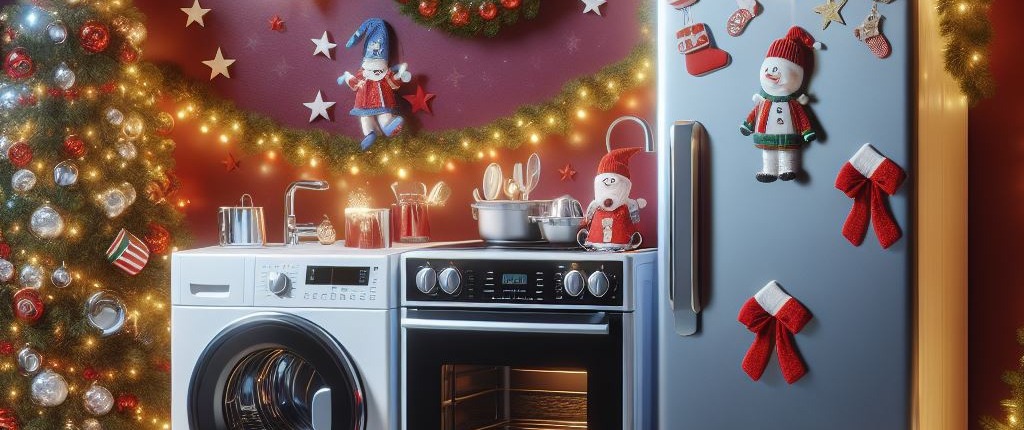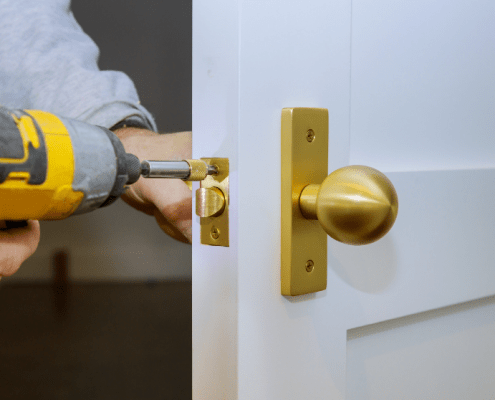How to prepare and maintain your appliances during the holidays
Samantha Bullington / Wednesday November 29, 2023
Who doesn’t love the convenience of household appliances? Whether it’s freshly laundered clothes from your washer or a hot meal from the oven, we’ve come to depend on these modern marvels, especially during the hustle and bustle of the holiday season.
But while we’re so busy this time of year, it’s easy to develop bad habits that can cause appliance problems or even shorten their lifespan. Some small oversights and minor mistakes can build up over time and eventually result in breakdowns, which may need pricey repairs.
The good news? With some education on proper use and care, many appliance issues can be avoided. A little preventative maintenance and regular cleaning go a long way when practiced consistently.
If you find that your appliances need some replacement parts this holiday season, grab your model number and head over to AppliancePartsPros.com.
Don’t wait until the last minute to check or repair your appliances. Order replacement parts early to avoid the holiday rush, shipping delays, holiday closures and out-of-stock items. The sooner you check your machine and place an order, the more likely that you’ll get the part on time. You can grab your model number and check AppliancePartsPros.com for the correct parts.
WATCH: How to keep your appliances in top shape
How to maintain your dishwasher
READ MORE: How Long Do Dishwashers Last? With 10 Tips to Keep Your Dishwasher in Great Shape
What NOT to do if you want your dishwasher to have a long service life:
- Do NOT wash items with labels still attached – Paper labels and their adhesive can clog filters and pumps, leading to lowered performance and flooding. Always remove product labeling before loading the dishwasher.
- Do NOT neglect routine filter cleaning – Food particles collect over time and form a gross slime coating if they’re not washed away regularly. Clean your dishwasher filters once a month.
- Do NOT use regular dishwashing liquid – Dishwasher detergents are formulated specifically to avoid suds, which can cause a dishwasher to flood a kitchen.
- Do NOT cram dishes and cookware too tightly – The water jets need open space to spin and make proper contact with items.
READ MORE: The Winter’s Chill: Can Cold Weather Affect Your Dishwasher?
What you SHOULD do:
- Check the spray arms for obstructions and remove any blockages that you find.
- Run an empty vinegar rinse cycle monthly to dissolve any mineral buildup in the machine.
- Check door seals and replace ones that have cracks or gaps allowing water to leak out.
- Make sure upper and lower racks slide smoothly in their tracks. Adjust the racks if they are misaligned.
- Confirm the compartments that hold detergent and rinse aid aren’t clogged or faulty. If needed, replace dispensers so the right cleaning product amounts are released each cycle. Check that dispenser lids close properly.
Bonus tip: If you notice a foul odor coming from your dishwasher even after cleaning, that’s a red flag of potential drainage problems or leaks that allow for mold growth.
READ MORE: How to Clean a Dishwasher
How to prepare and maintain your fridge & freezer
In the war against spoilage, refrigerators are center stage. However, modern convenience comes at a price if certain guidelines are ignored:
- Do NOT overstuff – Blocked airflow forces the compressor to work harder, which can cause parts to wear out prematurely. Try to only fill it to 70-75% of its capacity.
- Do NOT neglect condenser coils – Dust buildup on these heat exchange coils reduces cooling efficiency, which can make the motor struggle. Consider deep cleaning the coils every 6 months.
- Do NOT transport improperly – Tilting refrigerators and freezers over 15 degrees during moving can disrupt lubricating oils, which can lead to compressor failure shortly after plugging them back in.
- Do NOT ignore early signs of trouble – This advice can be applied to all appliances. If your fridge runs constantly but fails to cool properly, work on troubleshooting the issue ASAP to prevent a complete appliance failure.
READ MORE: Freezer Too Cold: Top 5 Reasons & Fixes
What you SHOULD do:
- Deep-clean your fridge and freezer well before adding holiday food inside. This will save you time and frustration from scrambling to try to make everything fit.
- Regularly vacuum dust bunnies from underneath and behind the unit to improve ventilation.
- Make sure your fridge and freezers are kept at the correct temperature. Ideally, your fridge should run between 37-40 degrees Fahrenheit and freezers should be set at 0 degrees Fahrenheit.
- Make sure the water filter has been changed recently. They should be changed every 6 months or so.
- Clean the condenser fan, which you can typically access through the compartment access cover at the lower rear of the fridge. The fan can get caked in dust and dirt. You can vacuum the grate and use a cloth to wipe the fan blades.
- Check the door seals (also called gaskets) to make sure they’re sealing correctly. The last thing you want during the holidays is a fridge that leaks out cool air. If you notice any door seals cracking or failing to stick in place, you should replace them as soon as possible.
READ MORE: How To Clean Refrigerator Coils
How to maintain your washing machine
To avoid a laundry list of washer woes during the holidays, avoid these common mistakes:
- Do NOT load objects without checking pockets – Loose change, pens, chapstick, etc. can leak ink and oils onto clothing, or worse, jam moving parts once the wash cycle starts.
- Do NOT leave wet loads sitting – Mildew and mold can start growing on damp fabrics within hours, which can cause bad odors or fabric damage.
- Do NOT load your machine to more than 2/3 of its capacity – Overloading the washer can put strain on its components and even cause items to end up in places they shouldn’t.
- Do NOT use too much detergent – You might think being more generous with your detergent means better cleaning power, but too much soap can cause a build-up in the machine tub, leading odors and damage. Excess detergent can also get trapped in laundry fabrics and fail to rinse away.
READ MORE: 5 Ways To Keep Your Clothes Washer In Great Shape
What you SHOULD do:
- Routinely wipe down the interior surfaces of the washer with diluted bleach to inhibit mold/mildew growth.
- Run monthly clean cycles with either vinegar or a commercial washer cleaner to help dissolve residue buildup.
- Spray down very dirty items and brush hairy items before washing them in the machine.
- Make sure your washer’s filters and hoses are clean and in good shape. They should be cleaned at least once a year. Check that the hose fittings are tight and rust-free. If the hoses have cracks, bulges, weak spots, or other signs of damage, replace them.
- Before starting a load of laundry, check the inside of the washer for any buildup, loose items or creatures. Make sure the inside is completely empty before you begin a cycle.
- After you’ve removed clothes from the washer, leave the washer door open and let the interior dry out. This will help to prevent bacteria and mold from growing.
READ MORE: How to Deep Clean a Washing Machine
How to maintain your dryer
Between heavy usage and high heat, clothes dryers are working overtime during the holidays. You can prolong the inevitable by avoiding these mistakes:
- Do NOT neglect lint trap and vent cleaning – Restricted airflow greatly reduces efficiency and overworks mechanical parts, which can wear out faster. It can also increase the chance of a fire.
- Do NOT overload – Overcrowding the dryer prevents proper tumbling, which lowers airflow and extends drying times.
READ MORE: 9 ways to improve your dryer’s performance
What you SHOULD do:
- Clean the lint trap after every load is finished, and clean the vent every six months. Regularly clean out dust and lint elsewhere in and around the outside of the dryer to minimize fire risks.
- Choose the appropriate heat settings. Delicate fabrics require lower heat settings to prevent shrinkage, fading, or distortion. Heavier fabrics need higher heat to break down the moisture trapped within their thick fibers.
- Consider using dryer balls or clean tennis balls during a cycle. These help create space between laundry as they tumble around, which allows hot air to evenly distribute and speeds up the drying process.
Bonus tip: The dryer vent should be constructed of a four-inch rigid metal pipe. Avoid the use of vinyl and foil vent hoses, since these restrict airflow and can become fire hazards.
READ MORE: How to Clean a Dryer Vent
How to prepare & maintain your cooktop & range
With all the high-temperature cooking that your range takes during the holidays, you’ll want to take care of it so you can quickly and easily prepare holiday meals for your guests.
READ MORE: 6 Gas Stove Safety Tips
Avoid the following mistakes:
- Do NOT allow spills/stains to linger – Burnt-on food and grease stains are hazardous and difficult to remove.
- Do NOT line ovens/broilers with foil – This can disrupt heat and airflow, which can lead to uneven cooking and potential fire hazards.
- Do NOT use the oven’s self-clean feature right before holiday cooking – The self-clean feature can be very useful for removing interior residue, but there are many safety precautions to take before using it to avoid damaging the appliance or harming yourself. If you decide to use the self-clean function, only use it a few weeks before preparing holiday food in case something goes wrong.
- Do NOT leave children or pets unattended – Children and pets should be kept away from an operating range and other potentially dangerous kitchen appliances at all times.
READ MORE: 6 Electric Stove Safety Tips
What you SHOULD do:
- Use the right cookware. Always match pans to the size of the burners and avoid oversized cookware. Never use thin, cracked, or damaged items on the stove or in the oven.
- Use the right heat settings. Learn your range’s traits so you can gauge the appropriate dials by sight and sound alone. Always adjust settings up or down gradually.
- Keep stove tops clear of debris that can bake on and be impossible to remove later. Always clean promptly after the appliance cools.
- Regularly clean drip pans under burners since grease residues can catch fire.
- Check door gaskets for any signs of wear or damage that can allow heat to escape. Replace as needed.
- If you have a gas range, regularly check for gas leaks. Escaping gas can lead to very dangerous situations if it’s not quickly fixed. It’s recommended to inspect your range’s gas connections yearly and whenever you smell gas. You should also check your carbon monoxide detectors to make sure they’re working correctly.
Bonus tip: If the burner output on your gas range seems diminished over time with smaller, slower-spreading flames, mineral scale has likely built up internally and restricted gas flow. So you’ll need to clean the burners.
READ MORE: How to Clean a Glass Stovetop
More information
Taking measures to prevent undue strain and excess wear on your appliances preserves their functionality and helps you avoid pricey repairs down the road.
Thanks for reading these holiday appliance maintenance tips! If you have any other repair needs or projects, you can find more resources including our DIY blog at AppliancePartsPros.com. There, you can enter your model number to order the exact parts you need. Most orders arrive in two business days.
You can also reach our award-winning customer service team at 1-877-477-7278, chat with a pro on our website and watch thousands of free video tutorials on our YouTube channel.
Hey there, I’m Samantha and I’m super excited to be a part of the Appliance Parts Pros team! With 9 years of experience, I’ve had the awesome opportunity to assist countless customers in troubleshooting their home appliances and finding DIY repair solutions.





